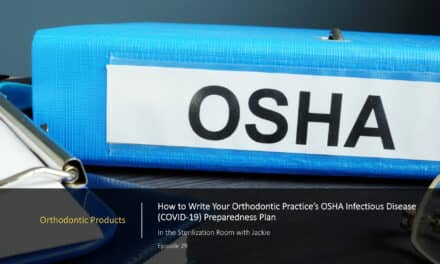How to strengthen your leadership, build your team, and improve practice operations.
By Roger P. Levin, DDS
The job of the orthodontic office manager is rarely clearly defined. At Levin Group, we use one simple definition. The orthodontic office manager is responsible for all operations of the orthodontic practice. This would include all administrative functions, the management of team members and anything related to practice operations. There are a few exceptions such as speaking to referring doctors, communicating clinical information to the clinical team, and anything that the orthodontist is legally required to perform, but that’s about it. How many orthodontists do you know who arrive at the office, attend the morning meeting, see patients all day, be instructed by team members where to be all day, and leave on-time at the end of the day having had a great energizing day with low stress and low fatigue? This only happens if you have an office manager who is acting as your chief operating officer.
Why Office Management Is a Learned Skill, Not a Natural Talent
Office management requires education and training. Most people do not possess a “natural skill” allowing them to be promoted into the position without any other management background at all. Learning to manage people and resources takes time, education, and mentoring. Few orthodontic office managers have these opportunities.
Leadership: The Most Challenging Management Skill
If you ask any young business entrepreneur what the hardest thing they had to learn was, they will tell you leadership, which is a major component of management. Learning how to assess people, move them into areas of their strengths, grow people with potential, etc, are all part of the skill set of office managers. And it is not an easy job.
Three Steps to Becoming a Better Office Manager
- Grow the people around you. If you do not trust the people around you and support their growth, they will stagnate and decline over time. Helping people grow involves providing guidance (without doing the job for them).
- Give each person goals. Every team member should have one to three goals that they are responsible for achieving in their job. These goals need to be clearly understood and measurable.
- Be humble. Some office managers gradually become overbearing and arrogant. The office manager needs to focus on the team and not themselves. A lack of humility on the part of the office manager leads to team stagnation and conflict.
READ MORE: Findings From the 2024 Orthodontic Practice Survey
The Long-Term Impact of Strong Practice Management
Management skills may be the hardest to acquire in an orthodontic practice. However, an office manager who masters these skills—ie, identifying team members’ strengths, fostering professional growth through coaching and mentoring, overseeing day-to-day operations, and does all this with humility—can create an environment where the team performs at its best and the orthodontist can focus on patient care. OP
Photo: ID 30207510 © Hongqi Zhang (aka Michael Zhang) | Dreamstime.com

Roger P. Levin, DDS, is the CEO and founder of Levin Group, a leading practice management consulting firm that has worked with over 30,000 practices to increase production. A recognized expert on orthodontic practice management and marketing, he has written 67 books and over 4,000 articles and regularly presents seminars in the U.S. and around the world. To contact Levin or to join the 40,000 dental professionals who receive his Practice Production Tip of the Day, visit levingroup.com or email [email protected].










